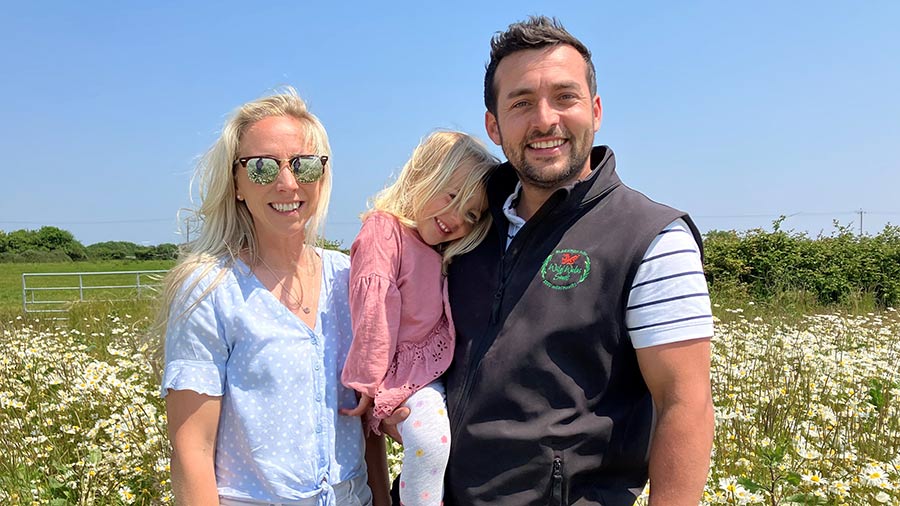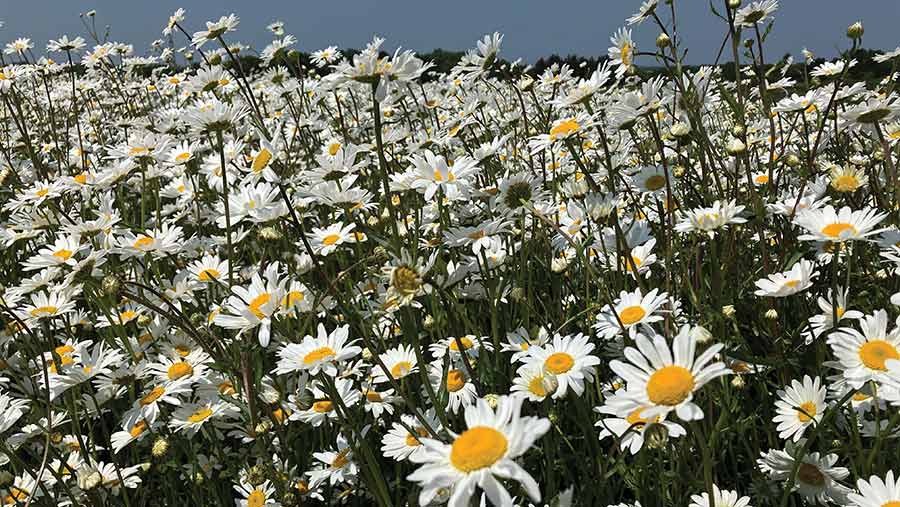Wildflower seed diversification gives arable tenants security
 © Emma Gillbard/MAG
© Emma Gillbard/MAG Diversifying a traditional arable rotation with a wildflower seed business has helped secure a viable future for one tenant farming family, who faced losing their farm to building developments.
In 2021, fourth-generation farmer Rhys Jenkins and wife Kelly had just one year’s notice to quit their tenanted 100ha farm when the land was set for building developments.
Despite four generations of the Jenkins family growing arable crops and rearing beef cattle for more than 80 years at Model Farm in the Vale of Glamorgan, Rhys and Kelly knew their farming business had to change.
See also: Photo of the Week: Love your lambs like Freya
If proposed building plans went ahead, they would be left with a mere 16ha of land, making it unviable to justify a farming existence.
Farm management opportunity
However, as one door closes another door opens. Rhys was invited to take on management of the nearby Fonmon Estate when new owner Nigel Ford heard of the family’s plight.
Nigel had specialist experience as a seed merchant, distributing wildflower seeds, and was looking to strike up a new partnership.
Having previously dabbled in a successful wildflower seed trial, Rhys and Kelly realised this could be a huge opportunity to scale up production, establish a new business and secure their farming future.
What started out as a small field trial of poppies has since grown into a flourishing enterprise – Wild Wales Seeds.
Establishing the enterprise has more than tripled farm profits.
The business is on course to become one of Britain’s largest growers and distributors of wildflowers, while also distributing grass seeds, cover and forage crops.
Development challenged
Fortunately, the proposed planning development at Model Farm has since been challenged, which prompted nationwide news coverage.
For now, Rhys and Kelly remain occupants of the land, but their long-term future at the farm lies unsettled.
“Going forward, we hope Wild Wales Seeds continues to go from strength to strength. After the initial shock and stress of potentially losing the farm, we are feeling positive about the future.
“We hope common sense prevails with the local council and we can continue to farm here at Model Farm for many generations to come.
“But whatever the outcome, the wildflower seed business has provided us with security,” says Rhys.
High-value break crop
The couple now grow 15 different varieties of wildflowers across 100ha, while Kelly manages the marketing side of the business.
Varieties grown include oxeye daisy, wild carrot, knapweed, corn marigold and white and red campion.
“The flowers are low-input but high-value crops, selling at £80-£90/kg. With no fertiliser or spray requirements, they produce exceedingly good profit margins,” explains Rhys.
They predominantly sells seeds to local councils for planting in parks, verges and roundabouts.
The wildflowers complement the existing arable rotation and act as a high-value break crop.
Crops grown include winter wheat, winter barley, oilseed rape and grass for the cattle enterprise.

Ox-Eye daisies © MAG/Emma Gillbard
Establishment
Flowers are planted following winter wheat as it is important to avoid high nitrogen soil scenarios.
“Flower species perform well on poorer quality soils and most of the farm’s soils are heavy clay over limestone so it works well,” says Rhys.
“Wildflower seeds are fine and delicate. We plant at a seed rate of 2.5kg/acre.
“Drilling conditions cannot be too windy as seeds can blow away,” he adds.
Once crops are established, hand-rouging is the main management tool. The delicate seeds can blow from field to field so keeping on top of volunteers is important.
The improvements to the soil and local biodiversity have been significant, with different flower species offering an array of root structures and habitats for pollinators.
“The biodiversity benefits have been stark,” explains the pair, who have since teamed up with a local beekeeper to produce honey with a number of beehives dotted around field margins.
Harvest and storage
When it comes to combining flowers, Rhys aims for just over 80% of the flower pods to be at peak seed.
More than this can be a risky gamble as it only takes one wind or rain storm for a complete loss of crop.
As flower heads begin to die off and seeds mature, crops are monitored closely. In some cases, Rhys checks fields up to four times a day.
“A few hours can make all the difference. Flowers can quickly disperse their seeds on the floor, which would otherwise lead to major yield losses,” he says.
What’s more, because the Jenkins grow a mix of annual and perennial flowers, some species are grown for up to six years.
Avoiding yield losses and the return of volunteers’ seeds is essential to maintaining a uniform canopy development to optimise seed quality.
Last year, harvest was completed in six weeks as the dry summer brought crops on at the same time.
However, this year’s harvest has been, like many arable farmers, a stop-start affair.
“The cereals started off well with OSR and barley, but the weather turned and made things difficult before the wheat harvest. It was very much stop-start between the showers.
“Luckily, the wildflowers are not monitored on a moisture-content basis, so we cracked on harvesting them sooner than we could the cereals,” says Kelly.
Sustainable future
With such high demand, flower crops are often sold before they are even cut from the field.
The family are now investing into a new storage facility that will enable them to dry and store up to six varieties at a time.
Kelly has the Wild Wales Seeds website kitted out with an online store.
Going forward, she plans to sell into local garden centres and offer a pick-your-own-flower enterprise at the farm to drive community engagement.
“We frequently receive messages from locals asking if it is OK for them to take pictures and get involved with the flower fields.
“They really are pleasing to the public eye so making the most out of this is a driver for us,” she says.
“Diversifying the arable rotation with wildflowers and establishing the seed business has secured our farming future.
“We hope the business continues to grow and provide opportunities for our two young girls, Ffion and Freya, who are mad keen on the farm,” says the couple.

